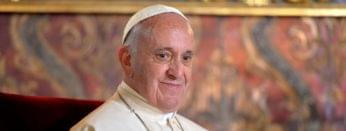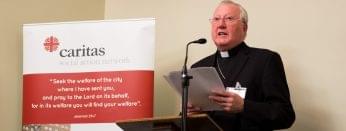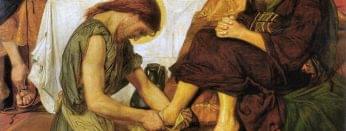As we reflect on Dilexi Te, the Apostolic Exhortation of the Holy Father Leo XIV On Love for the Poor, we are reminded that “the condition of the poor is a cry that constantly challenges our lives, societies, and the Church.” On their wounded faces, we see the suffering of Christ himself. Poverty, the Holy Father writes, “is no longer a single, uniform reality,” but many: material, moral, social, and spiritual. Dilexi Te calls us not to turn away, but to respond with love made visible through justice, solidarity, and action. In England & Wales at the current time there are a number of practical ways that we can show our love for the poor.
1. End Child Poverty – End the Two-Child Benefit Cap
“The commitment to the poor and to removing the social and structural causes of poverty has gained importance in recent decades, but it remains insufficient.” (Dilexi Te, 10)
As we approach the Autumn Statement, this call could not be more urgent. The two-child benefit cap has kept 350,000 children in poverty and pushed another 700,000 deeper into hardship (Child Poverty Action Group). In one of the world’s wealthiest nations, “more and more families find themselves unable to make it to the end of the month.” (Dilexi Te, 12) This is not a policy rooted in justice, but in inequality, and it must end.
Now is the moment forCatholics across England and Wales to raise their voices. We are called to see in the hungry child and struggling parent the face of Christ himself, and to act with both compassion and courage. Let us make clear to our leaders that our society will be judged by how it treats its poorest families. We urge you to write to your MP on this issue using the Catholic Bishops’ Conference of England & Wales E-Campaign: www.cbcew.org.uk/contact-mp-two-child-cap
2. Protect Life and Dignity – Oppose the Assisted Dying Bill
“The poverty of those who find themselves in a condition of personal or social weakness or fragility” (Dilexi Te, 9) reminds us of those nearing the end of life, whose suffering calls for accompaniment, not abandonment. The Assisted Dying Bill, now before the House of Lords, risks creating an environment where people feel pressured to end their lives rather than be perceived as a burden. This pressure is a new and subtle form of poverty, one that denies the dignity of the most vulnerable.
We urge Catholics to join the Bishops’ Conference of England and Wales campaign opposing the Assisted Dying Bill, and to write to a Member of the House of Lords to speak for those who cannot. In the face of fear, let us choose compassion; in the face of pressure to die, let us choose to accompany and to love.
cbcew.org.uk/opposing-assisted-suicide
“When the Church kneels beside a leper (Dilexi Te, 52), a malnourished child or an anonymous dying person, she fulfils her deepest vocation: to love the Lord where he is most disfigured.”
3. Standing Together Against Hate and Division
We stand with the Jewish community in their grief after the violent attack and deaths at the Synagogue in Manchester, on the holiest day of the Jewish year. We hold all those affected in our prayers. We condemn the arson attack on Peacehaven Mosque just two days later, which could have led to loss of life. Places of worship should be spaces of safety for faith communities and for all, not places of fear.
While politicians, the media, and far right activists seek to weaponise these deeply painful events to further their own agendas. They sow division in our communities by promoting an exclusionary and racist nationalism. Inspired by the Gospel we work against this. Day-to-day, Catholic organisations up and down the country affirm, through acts of solidarity, the dignity of those of all backgrounds and ethnicities. Hope Not Hate’s latest research has demonstrated that the vast majority of people are positive about the diversity of their communities, with 4 out of 5 saying they like mixing with people from other ethnicities, religions and backgrounds in their local area (https://hopenothate.org.uk/state-of-hope/).
Let us stand alongside those of all faiths in our shared work to tackle prejudice and hate and to build mutual understanding. Grounded in the social value of truth, let us refuse to participate in blaming societal problems on groups of a certain ethnicity, faith or migration status, and seek to better understand and address racism, antisemitism and Islamophobia both in the church and in wider society. Instead, let us work to name and challenge together to the structural causes of poverty, inequality and exploitation.
“Let us dream, then, as a single human family, as fellow travellers sharing the same flesh, as children of the same earth, which is our common home, each of us bringing the richness of his or her beliefs and convictions, each of us with his or her own voice, brothers and sisters all.” (Fratelli Tutti, 8)




